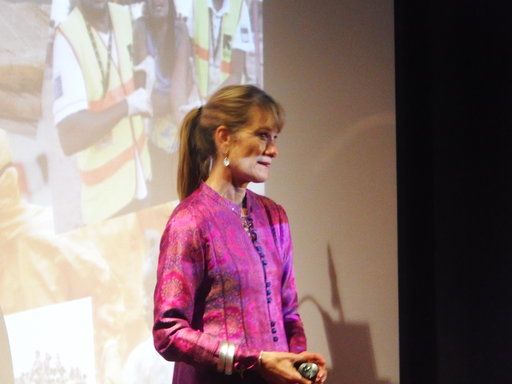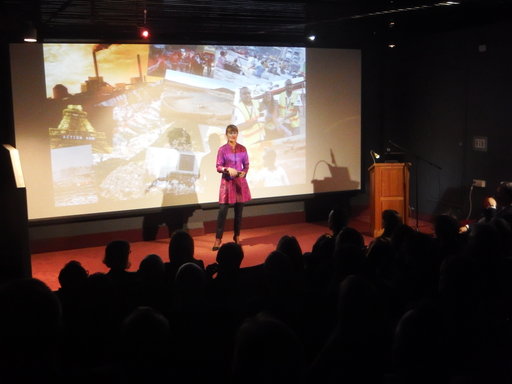

American Jacqueline Novogratz delivered an illuminating talk last night on how Jersey can help the disadvantaged countries of the world.
A friend to the likes of Bill Gates and Ted Turner, her 2009 New York Times Bestseller ‘The Blue Sweater: Bridging the gap between rich and poor in an interconnected world,’ was inspired by a real life event.
During a routine jog, Ms Novogratz spotted a boy wearing a blue sweater in Rwanda. It turned out to be the same blue sweater that she had donated a decade earlier.
The jumper, with a snow-capped mountain and two zebras, had her name on it. That lead to her belief that the world is now a very interconnected place and has been an influence on her ever since.

She gave a warmly-received lecture last night at Jersey Museum on how ‘impact’ investment can help transform poorer communities.
She said: “Jersey can make a difference, just as anyone can. It is about looking at a problem and finding ways to solve it. It is really that simple, but at the same time to make real change can be incredibly complex.”
As Acumen Chief Executive and founder, she began work in her current field in 1986 after quitting her job on Wall Street with Chase Manhattan Bank.
Her first posting was with the World Bank and UNICEF in Rwanda and since then Acumen, which she created in 2001, has invested more than £100m in 96 countries including Uganda, Kenya, Ghana, Pakistan, Columbia and India.
That money has helped to create more than 60,000 jobs and brought basic services such as affordable education, health care, clean water, energy, integrated agriculture and sanitation for more than 200 million people.
The Acumen Fund, in essence, deals with the issue of impact investment. Its task is to generate social and environmental impact, alongside a financial return, in both emerging and developed countries.
The impact investment sector was worth around £30bn two years ago and is growing at a rate of about 20% per annum.
She said: “We don't give out handouts, we invest in people. We measure what we do in terms of both financial return as well as social impact. We discuss and report back on our failures as much as our successes. We don't consider ourselves as having ‘donors.’
“At Acumen, we have investors, although they don't receive a monetary return on their investments in the traditional sense of that term. Instead, they invest and become stakeholders in what we do because they want to share in our successes and learn from our failures.
“We have five portfolios - health, water, housing, agriculture and energy. For all our investments, we measure impact in terms of both social and financial returns. We also gather breakthrough insights that help us develop a library of knowledge about how to build businesses that can serve individuals earning less than four dollars a day.
“One of our investments in India, builds community water systems that use cutting-edge technology to provide clean water to rural villages at very low cost. They've built 285 systems in just the past few years and have a customer base of 250,000 individual families purchasing clean drinking water. And now they're expanding all over India by partnering with government.”
Comments
Comments on this story express the views of the commentator only, not Bailiwick Publishing. We are unable to guarantee the accuracy of any of those comments.